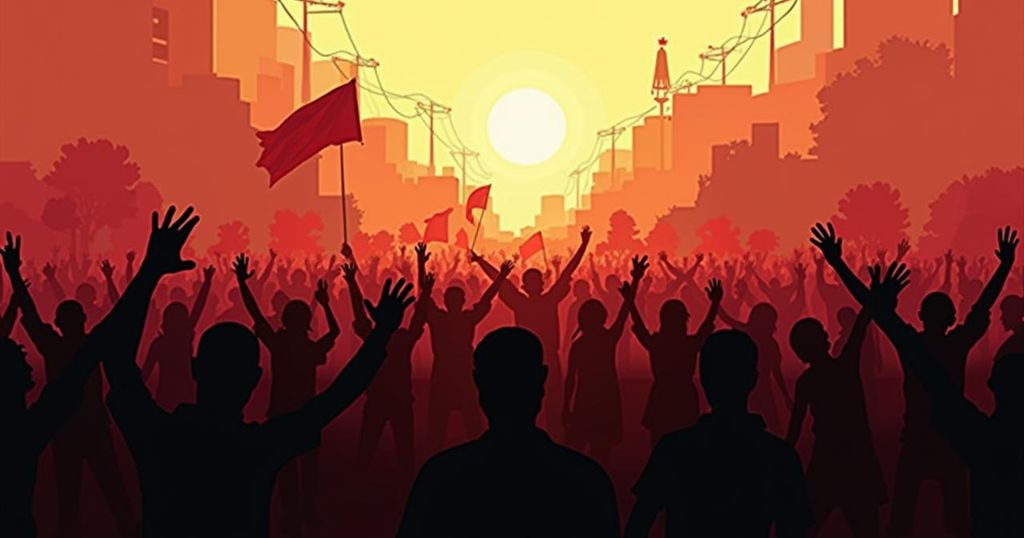Mass Protests in Iran and Yemen Against Israeli Attacks on Lebanon

On Friday, massive protests erupted in Iranian cities and Yemen’s capital, Sanaa, as tens of thousands condemned Israeli attacks on Lebanon and Gaza. The gatherings were called by Iranian authorities to show support for Hezbollah amidst escalating violence in the region, reflecting a broader anti-Israeli sentiment among Iranian and Yemeni citizens. Protests included flag burning and expressions of solidarity with Lebanon and Palestine, indicating a strong unified opposition against perceived Israeli aggression.
In a significant display of solidarity, tens of thousands of individuals took to the streets in various Iranian cities and in Yemen’s capital, Sanaa, on Friday to denounce Israeli military actions against Lebanon and Gaza. The protests were largely organized following a call from Iranian authorities urging support for Hezbollah amidst ongoing tensions in the region. Demonstrators gathered in Tehran’s Enghelab Square after Friday prayers, brandishing portraits of Hezbollah’s leader, Hassan Nasrallah, and chanting slogans such as “Israel is destroyed. Lebanon is victorious,” while expressing outrage at the perceived violence inflicted upon Lebanon. Protesters also engaged in the burning of Israeli and American flags, symbolizing their discontent. Across Iran, significant protest activities were reported in cities including Semnan, Qom, Kashan, Kermanshah, Shiraz, and Bandar Abbas. In Yemen, the Iran-aligned Huthi rebels orchestrated a massive rally in Sanaa, attracting a similar crowd of tens of thousands. Many participants displayed arms and vocalized their unwavering support for Lebanon, signaling solidarity with the ongoing resistance against Israel. Huthi supporter Mortada al-Mutawkil remarked, “We say to our brothers in Lebanon that you will be victorious, God willing.” This reflection of unity in Yemen follows an incident where Huthis fired missiles towards Israel, further escalating regional tensions. Echoing these sentiments, protests also occurred in Bahrain, an ally of Israel, where participants expressed solidarity with the people of Gaza and Lebanon, demanding a cessation of normalization with Israel. This current wave of protests comes on the heels of a significant escalation in violence that began with Hamas’s attack on Israel on October 7, which has resulted in numerous cross-border hostilities with Hezbollah. Reports indicate that since the escalation began, Israeli strikes on Lebanon have been the deadliest since the civil conflict that gripped the nation from 1975 to 1990, resulting in hundreds of casualties. As the situation remains fluid, analysts observe that Iran is attempting to navigate its support for Hezbollah without becoming excessively embroiled in the burgeoning conflict.
This article examines the recent series of protests in Iran and Yemen responding to Israeli military actions in Lebanon and Gaza. The protests reflect heightened tensions in the Middle East, particularly following Hamas’s assault on Israel which instigated retaliatory actions, including cross-border attacks from Hezbollah. The support for Hezbollah and denouncement of Israeli actions are part of a broader alliance involving Iranian-backed groups in the region, illustrating the complexity of Middle Eastern geopolitics. This collective action underscores the alliances formed amidst long-standing conflicts, with Iran positioning itself in defense of its regional allies against perceived Israeli aggression.
The recent protests across Iran and Yemen underline the deep-seated grievances against Israeli military operations in Lebanon and Gaza. Tens of thousands have expressed their solidarity with Hezbollah, emphasizing the ongoing tensions and the potential for escalation. As violence continues to unfold, both regional and international dynamics are at play, with Iran aiming to bolster its allies while avoiding direct confrontation. This complex web of alliances and hostilities highlights the challenges faced in achieving lasting peace in the region.
Original Source: www.france24.com







